THE BUILDING OF THE TOWER OF BABEL
What the language was, we simply do not know.
I believe whatever that language was will be the language that will be spoken in heaven, and it will be a much better language than we have today, with more specific nouns and verbs, adverbs, and adjectives.
Genesis 10 provided a table of the nations, describing the peoples and tribes that descended from Noah’s three sons and where they settled.
Genesis 11 describes how God scattered the peoples of the world after confusing their languages to stop the building of Babel and its tower.
The chapter also provides a direct genealogy from Noah to Abram and then introduces Abram by way of his father Terah. The following chapter will begin the story of Abram and God’s chosen people, Israel.
Genesis 11:1-9 KJV
[1] And the whole earth was of one language, and of one speech.
[2] And it came to pass, as they journeyed from the east, that they found a plain in the land of Shinar; and they dwelt there.
[3] And they said one to another, Go to, let us make brick, and burn them throughly. And they had brick for stone, and slime had they for morter.
[4] And they said, Go to, let us build us a city and a tower, whose top may reach unto heaven; and let us make us a name, lest we be scattered abroad upon the face of the whole earth.
[5] And the LORD came down to see the city and the tower, which the children of men builded.
[6] And the LORD said, Behold, the people is one, and they have all one language; and this they begin to do: and now nothing will be restrained from them, which they have imagined to do.
[7] Go to, let us go down, and there confound their language, that they may not understand one another’s speech.
[8] So the LORD scattered them abroad from thence upon the face of all the earth: and they left off to build the city.
[9] Therefore is the name of it called Babel; because the LORD did there confound the language of all the earth: and from thence did the LORD scatter them abroad upon the face of all the earth.
Genesis 11:1
And the whole earth was of one language, and of one speech.
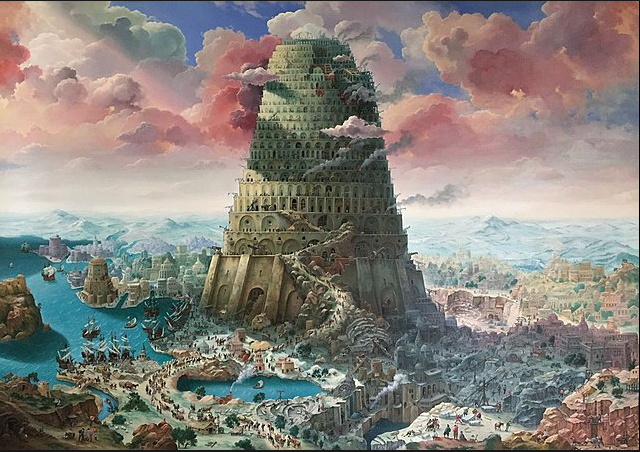 God, who made man as the one creature with whom He could speak (1:28), was to take the gift of language and use it to divide the race, because the apostate worship at Babel indicated that man had turned against God in pride(vv.8,9).
God, who made man as the one creature with whom He could speak (1:28), was to take the gift of language and use it to divide the race, because the apostate worship at Babel indicated that man had turned against God in pride(vv.8,9).
Genesis 11 returns to a narrative where the world of man has not yet scattered across the earth into the nations, tribes, and languages described in chapter 10.
Chapter 10’s focus was broad, and looking far into the future, many generations from the end of the flood.
The actual division of nations, as described in the Bible, will not happen until after humanity is divided by language and scattered across the globe. This event happens here, in chapter 11, at the Tower of Babel.
The descendants of Noah’s three sons, Shem, Ham, and Japheth, remained together for a while, then migrated away from the region around Ararat, where the ark settled.
It makes sense, given this context, that humanity continued to have one language and to share the same words, or common speech. Only one people group existed on the earth, and they all shared the same culture.
Unfortunately, this led to almost the same problem which happened prior to the flood: a unified humanity can use that unity for sin, something God does not plan to allow (Genesis 11:6).
Genesis 11:2
And it came to pass, as they journeyed from the east, that they found a plain in the land of Shinar; and they dwelt there.
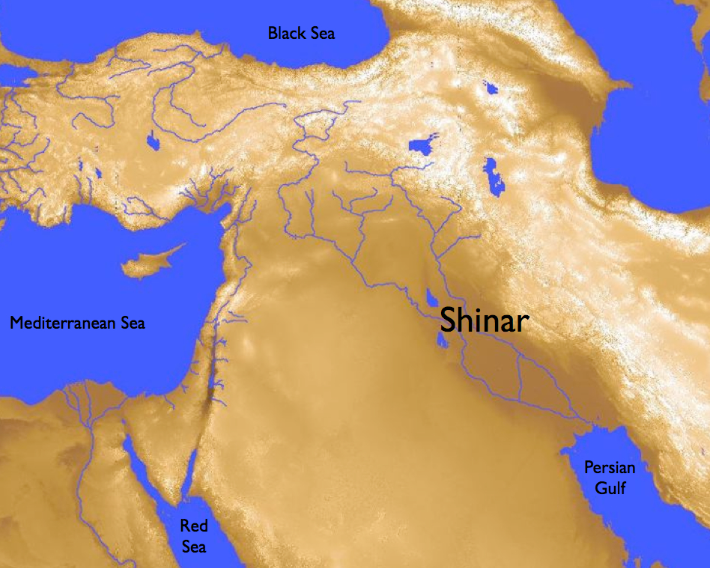 “As they journeyed from the east”—notice it was from the east. Mankind was apparently moving toward the west. “They found a plain in the land of Shinar,” which is in the Tigris-Euphrates Valley.
“As they journeyed from the east”—notice it was from the east. Mankind was apparently moving toward the west. “They found a plain in the land of Shinar,” which is in the Tigris-Euphrates Valley.
God had restated His commission for man to “be fruitful and multiply and fill the earth” (9:7). It was in the course of spreading out that the events of this account occurred.
The previous chapter described all the nations, tribes, and languages that came from Noah’s three sons. Genesis 11 backs up the story to the era before the people groups were divided.
Until this point, the families of Shem, Ham, and Japheth remained together as a single people group with a single culture. Verse 1 told us they all shared the same language.
Here, in verse 2, we’re told that this growing extended family migrated away from the region where the ark settled to the land of Shinar. Shinar is the region where Babylon will be established.
Thus, at this point in the history of the earth, all the peoples of the world were gathered together in one region.
While it sounds wonderful for mankind to be united in culture and language, human sin makes this a dangerous condition. As shown prior to the flood, mankind’s natural habit is towards depravity (Genesis 6:5).
The need to restrict man’s cooperation with man, at least to some extent, is a major reason for God’s actions in this passage (Genesis 11:7–8).
Genesis 11:3
And they said one to another, Go to, let us make brick, and burn them throughly. And they had brick for stone, and slime had they for morter.
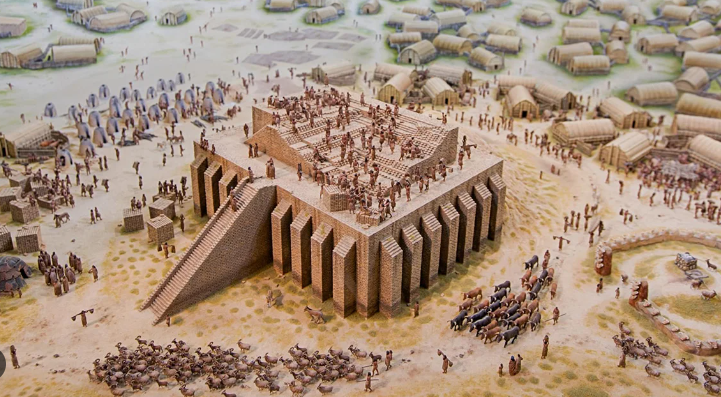 Down in that area there is no stone, and so they made bricks. That in itself reveals something about the substantial character of their buildings. Even today brick is a popular type of building material.
Down in that area there is no stone, and so they made bricks. That in itself reveals something about the substantial character of their buildings. Even today brick is a popular type of building material.
Yet the brick was used there because of its practicality; it was a necessity.
While dispersing, a portion of the post-Flood group, under the leading of the powerful Nimrod (10:8-10), decided to stop and establish a city as a monument to their pride and for their reputation.
The tower, even though it was a part of the plan, was not the singular act of rebellion. Human pride was, and it led these people to defy God. They were refusing to move on, i.e., scattering to fill the earth as they had been instructed.
In fact, this was Nimrod’s and the people’s effort to disobey the command of God in 9:1 and, thus, defeat the counsel of heaven. They had to make bricks, since there were few stones on the plain.
The previous verses revealed that the peoples of the earth had not yet divided and scattered into separate tribes and nations. The descendants of Shem, Ham, and Japheth remained a single people group with a single culture and language.
Together, they had migrated to the region of Shinar where Babylon would be established.
Here, we’re told that together these people made plans to build a huge structure in their new homeland. This verse seems oddly specific in describing their building materials: bricks hardened by burning—or baking—and mortar made from tar.
Scholars suggest there is wordplay going on in these verses, connecting the words for these building materials to the name of Babel.
In addition, Israelite readers would have likely been interested to know that these ancient people used bricks while they themselves often used stone for building.
Genesis 11:4
And they said, Go to, let us build us a city and a tower, whose top may reach unto heaven; and let us make us a name, lest we be scattered abroad upon the face of the whole earth.
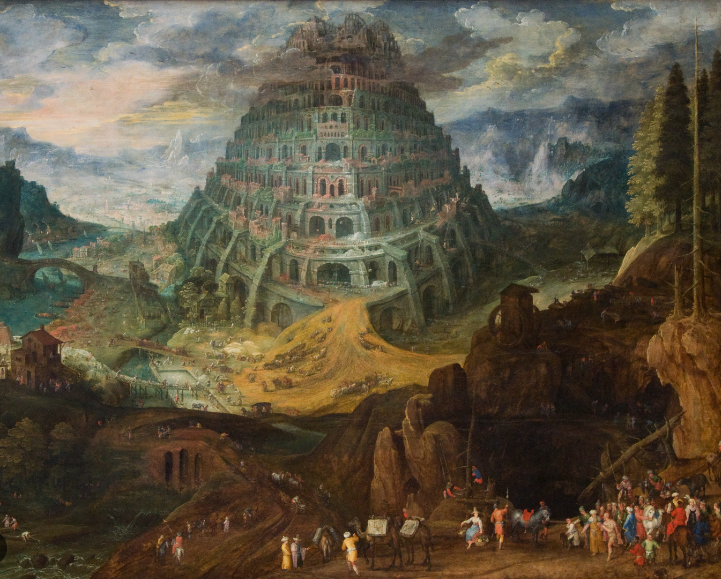 The tower would not actually reach to the abode of God and the top would not represent the heavens. They wanted it to be a high tower as a monument to their abilities, one that would enhance their fame.
The tower would not actually reach to the abode of God and the top would not represent the heavens. They wanted it to be a high tower as a monument to their abilities, one that would enhance their fame.
In this endeavor, they disobeyed God and attempted to steal His glory. Notice that they said, “Let us build us a city . . . and let us make us a name, lest we be scattered abroad.”
They had a bad case of perpendicular I-it is—let us make us a name! In my opinion, the sole purpose of this tower was for a rallying place for man. The Tower of Babel was a ziggurat. There are many ruins of ziggurats in the Tigris-Euphrates Valley.
The ruins of one in Ur of the Chaldees where Abraham lived was made of brick, solidly constructed, and around it was a runway which went to the top. Apparently, on top of it was an altar on which, in certain instances, human sacrifices were offered.
Later on children were offered, put in a red-hot idol. All of this was connected with the ziggurat in later history. But at the time of its construction, the Tower of Babel represented the rebellion of mankind against Almighty God.
Apparently it was Nimrod who led in this movement. He was the builder of the city of Babel and evidently of the Tower of Babel also. It was to be a place for him to rear a world empire that was in opposition to God.
In order to realize his ambition and to make his dreams come true, two features and factors were essential:
First, he needed a center of unity, a sort of headquarters, as it were. He needed a capital, a place to assemble, a place to look to. This was why he built the city of Babel. It fulfilled one of his requirements to carry out his dream of world empire.
Secondly, he needed a rallying point, not just geographical but psychological, that which gives motive—a spark, an inspiration, a song, a battle cry, sort of like a “rally-around-the-flag-boys.”
There had to be some impelling and compelling motivation. There had to be a monument, Lenin’s tomb is where Communism meets, and in Nimrod’s day it was the Tower of Babel.
“Let us make us” is defiance and rebellion against God. “Let us make us a name” reveals an overweening ambition. Now let’s see what the Tower of Babel was not. It was not built as a place of refuge in time of high water.
He wasn’t building above the flood stage, as some expositors suggest. In fact, I consider that a very puerile interpretation.
After all, Lenin’s tomb is not a place of refuge when the Volga River overflows! No, this tower revealed the arrogant, defiant, rebellious attitude of man against God.
God had said to man that he should scatter over the earth and replenish the earth. But man in essence answered, “Nothing doing. We’re not going to scatter; we are going to get together. We are through with You.”
The Tower of Babel was against God. Also, the Tower of Babel was a religious symbol. It was a ziggurat.
All through that valley, as I have indicated, there are ruins of ziggurats. They were places where people worshiped the creature rather than the Creator.
Some ziggurats were round, others were square, but all of them had runways leading to the top, and on the top the people carried on the worship of the sun, moon, and stars.
After all, when they could see the sun, moon, and stars, they knew they were not going to have a flood, and they felt that God had been pretty mean to have sent the Flood.
Now notice God’s reaction to the Tower of Babel—
At this point in the history of the world, all the peoples on earth existed as a single culture with one shared language.
The descendants of Shem, Ham, and Japheth had not yet divided and dispersed into the separate nations, tribes, and languages described in chapter 10. And, for this moment, they wanted to keep it that way.
They did not want to disperse and go in different directions (Genesis 9:1).
Most likely, the people recognized that there was power and safety in their unity. If they could remain one people, they would be stronger and safer.
If they divided, each group would be weaker and, likely, under threat of war and conflict with other groups. Their motive makes sense to us, but their plan to accomplish their objective was to make themselves great in a way that God found arrogant and dangerous.
The scheme mankind concocts is to build a strong, defensible city with a massive tower that would reach to the heavens. They would “make a name” for themselves.
If, as a people, their city was unable to be defeated and they were prosperous and strong, why would any among them want to leave and risk becoming their rivals?
This culture of man believed that self-glorification and self-reliance would achieve their greatest goals. They did not, apparently, acknowledge God in any way or seek His help.
The following verses will reveal that though they can accomplish much, God will not allow them to achieve their plan.
Genesis 11:5
And the LORD came down to see the city and the tower, which the children of men builded.
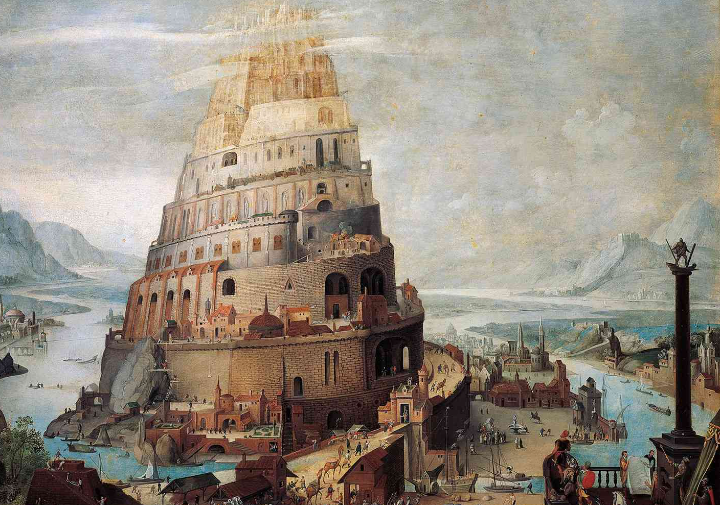 Just as the emphasis in the “upward” part of the inversion is on man’s activity to the exclusion of God, the emphasis in this “downward” arm is on God’s activity to the exclusion of man-the only activity that man “undertakes” in this section was that of “ceasing” to build.
Just as the emphasis in the “upward” part of the inversion is on man’s activity to the exclusion of God, the emphasis in this “downward” arm is on God’s activity to the exclusion of man-the only activity that man “undertakes” in this section was that of “ceasing” to build.
The statement that the LORD came down should be understood as a literary-theological device emphasizing the actual futility of man’s goal and the essential “distance” between him and God.
At the same time this “distance” between man and God is immediately “bridged” by God’s goal in “coming down,” namely, to see what man had done.
The united peoples of earth make a plan to exalt themselves, by building a tower in their city that would reach to the heavens. Instead of asking God for help, they set out to make themselves powerful enough to get what they wanted.
Many scholars see this as a deliberate attempt to guard against another flood, by making a structure specifically intended to protect mankind from God’s judgment.
This verse is probably intended to be taken in a dry, almost sarcastic tone. The text reveals that God chooses to “come down” to even see their tower.
Of course, God did not need to travel any distance in any direction to see or know what was happening on the earth.
Instead, the language is meant to emphasize what a silly idea it was that people could build a tower that would reach to the heavens, or prevent God from enacting His will.
In a more direct sense, this verse shows God “playing along,” much as He did when Adam hid from Him in the garden of Eden and God called out (Genesis 3:8–10).
Genesis 11:6
And the LORD said, Behold, the people is one, and they have all one language; and this they begin to do: and now nothing will be restrained from them, which they have imagined to do.
 Concerned for what is best for man, God “assessed” their building activity, as represented by the statement, this is what they began to do, and now nothing which they purpose to do will be impossible for them.
Concerned for what is best for man, God “assessed” their building activity, as represented by the statement, this is what they began to do, and now nothing which they purpose to do will be impossible for them.
They were so united that they would do all they desired to do. This is a tremendous statement! Since all the people spoke one language, they didn’t have the great language barrier.
They could get together and pool their knowledge and resources—”and now nothing will be restrained from them, which they have imagined to do.”
We find here that man has a fallen nature in spite of the Flood and that he is totally depraved. God cannot ignore this rebellion, for it is a rebellion against Him.
God is going to put up a protective wall. He is going to throw up a barrier. This was necessary because man is such a very capable creature.
He can go to the moon and he can fly in a jet plane. I still am amazed that I can sit in a jet plane, flying five miles high in the air and be served a delicious dinner.
I just can’t get over it, I’ll be honest with you. It seems unbelievable. Man has done that, friend. Man is a very competent creature.
You can see what mankind would do with one language if they all came together against God. So notice what God did—
After seeing the city and the tower that the united people of the earth had built, God does not dismiss their efforts as weak and futile. Instead, He acknowledges that by working together, humanity would can accomplish whatever they set out to do.
This, of course, leads to an immediate question: why is that a problem? Why would God stand opposed to such unified productivity?
The answer is in mankind’s capacity to turn gifts into curses (Genesis 3:17–19), and abilities into abuses. The flood had not changed the nature of sinful human beings.
God’s observation in Genesis 6:5 still applies to the hearts of humans left to themselves: “The Lord saw that the wickedness of man was great in the earth, and that every intention of the thoughts of his heart was only evil continually.”
A powerfully united humanity, inclined to do evil, could accomplish great wickedness. No matter how perverse, outrageous, or ridiculous something might seem, mankind can and will attempt it, given the opportunity.
The following verse reveals that God has no plans to give humanity that kind of opening.
Genesis 11:7
Go to, let us go down, and there confound their language, that they may not understand one another’s speech.
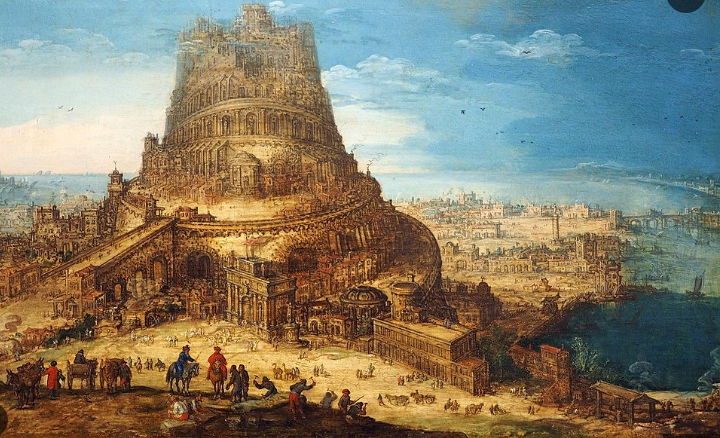 Consistent therefore with this well-established pattern, God’s act of “confusing” (i.e., differentiating) the language of man was intended not only as an act of punishment, but also as an act of grace.
Consistent therefore with this well-established pattern, God’s act of “confusing” (i.e., differentiating) the language of man was intended not only as an act of punishment, but also as an act of grace.
At this point in history, the peoples of the earth remained undivided, with one language and culture. They had also decided to remain unified and become great and powerful by their own strength and ability.
They did not apparently worship God or call to Him for help.
So, God “came down,” and saw the great city and tower they had made. The verse uses the phrasing “let us” with respect to God. Similar language is used in Genesis 1:26 and 3:22.
God may be speaking to Himself within the Trinity of Father, Son, and Holy Spirit. Alternatively, He may be commanding the angels to come and participate.
In either case, God acknowledges that by working together, nothing would be impossible for humanity. More specifically, God points out that mankind is capable of enormous evil, when their sinful natures become aligned.
God is not attempting to stifle mankind’s potential to accomplish “anything” good, but He is very concerned about their potential to accomplish “anything” evil.
God decides to stop their progress by dividing the people according to language, for starters. People who speak different languages have an immediate barrier to communication, making it harder to cooperate.
Further, this would naturally begin to separate people into groups, based on those languages, and in fulfillment of God’s intent for man after the flood (Genesis 9:1).
Genesis 11:8
So the LORD scattered them abroad from thence upon the face of all the earth: and they left off to build the city.
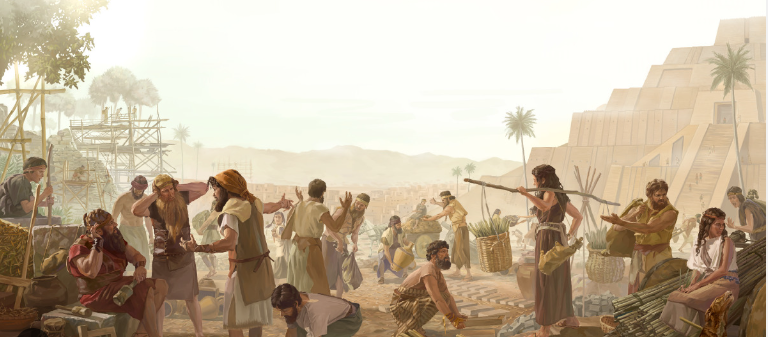 God addressed their prideful rebellion at the first act. They had chosen to settle; He forced them to scatter.
God addressed their prideful rebellion at the first act. They had chosen to settle; He forced them to scatter.
This account tells how it was that the families of the earth “were separated, everyone according to his language” (10:5) and “were divided on the earth after the flood” (10:32).
In the previous verse, God decides to confuse the languages of the united peoples of the earth. This was specifically intended to stop them from accomplishing whatever they set out to do.
In context, God’s concern is that a united humanity will slip back into the same cycle of sin and death as existed prior to the flood (Genesis 6:5).
Now, we’re told that God also dispersed humanity from the area of Shinar all over the earth. Taken at face value, these verses describe supernatural acts of God in creating and assigning languages to people and placing them where in the earth He wanted them to be.
Other interpreters see God’s actions in this chapter in a more gradual way, describing the effects without necessarily implying that they were immediate.
Taken literally, Genesis’ claim is that these languages did not develop naturally over time as people developed their own variations on an original language.
God simply did it. Such an act would require enormous power, creativity, and authority. Certainly, the God who created the world and sent a global flood would be capable of such actions.
God’s initial command to Noah and his sons was to fill the earth (Genesis 9:1). Since the people refused to separate and obey God in this way, God did it for them. He would not allow humanity to set its own agenda for the earth.
Building on the city came to a stop. It would no longer be the focus of humanity’s combined effort. The place took on the name Babel, which is very similar to the Hebrew word for “confusion.” Later, this city would be known as Babylon.
Genesis 11:9
Therefore is the name of it called Babel; because the LORD did there confound the language of all the earth: and from thence did the LORD scatter them abroad upon the face of all the earth.
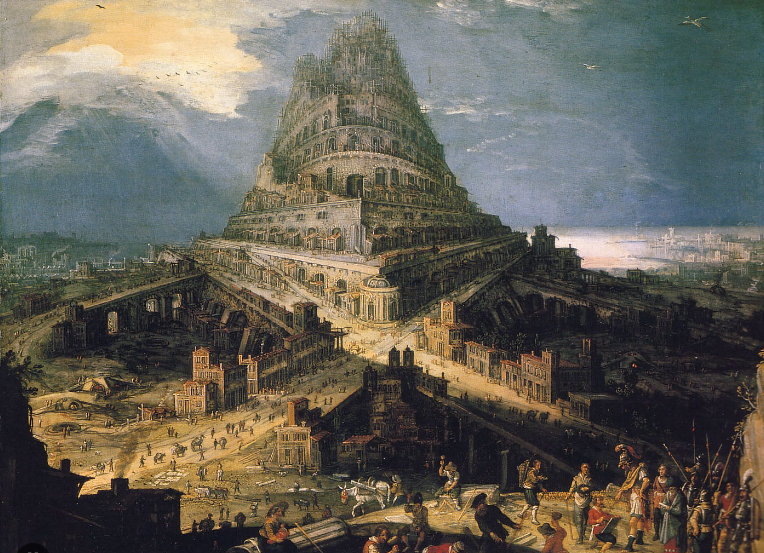 This is linked to a Hebrew word meaning “to confuse.” From this account, Israel first understood not only how so many nations, peoples, and languages came about, but also the rebellious origins of their archetypal enemy, Babylon (cf 10:5, 20, 31).
This is linked to a Hebrew word meaning “to confuse.” From this account, Israel first understood not only how so many nations, peoples, and languages came about, but also the rebellious origins of their archetypal enemy, Babylon (cf 10:5, 20, 31).
Because they would not fill the earth as God had commanded them, God confused their language so that they had to separate and collect in regions where their own language was spoken.
Verse 9 sums up God’s act of judgment with a play on words. The word for the name of the city Babel is very similar in Hebrew to the word for “confused.”
In fact, the whole section of verses 1 through 9 includes several allusions, in the Hebrew language, to the name of Babel. It is very likely that Babel became known as Babylon, the great and ancient city that became a seat of power in the world.
This city, in fact, would later become symbolic of the man-centered, worldly system which sets itself against God.
Later, the Babylonians were quite proud of their impressive city. God’s people understood, however, that the city’s history was evidence that human pride and arrogance cannot stand against God.
He stops the plans of humanity anytime He chooses to do so (Job 42:2).
One day, though, God will create a new kingdom with a single language and culture once again. Zephaniah 3:9–11 describes that moment, and the Holy Spirit’s act of uniting the languages at Pentecost may hint at it as well (Acts 2:6–11).
I hope that you have really enjoyed this post,
Please Leave All Comments in the Comment Box Below ↓

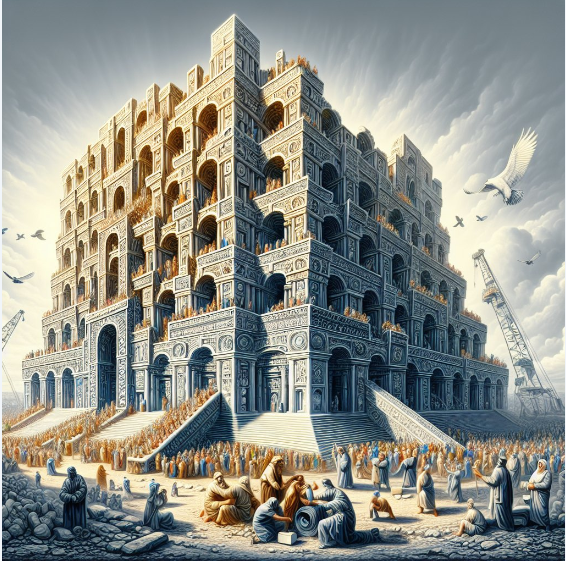











Thank You All for taking the time to view this material. I truly hope this information will help assist in you in your studies.
I feel like the Bible leaves out a lot of important detail in passages like these. Pages upon pages of listing a family tree of who begat who is not a compelling read, but perhaps it would be if there were more biblical details included about why it’s important to understand the family line of these ancient ancestors. What do you think is the significance of all the family history here?
Hello Aly,
Thanks for commenting. My answer to your question is Jesus Christ.
May The Lord Continue To Bless You In Many Ways!
Wow, the story of the Tower of Babel is truly fascinating!
It’s incredible to think that all the people on Earth once shared a single language and culture. The unity they had was powerful, but unfortunately, their intentions were fueled by pride and rebellion against God. They aimed to build a tower reaching the heavens and make a name for themselves, refusing to obey God’s command to scatter and fill the Earth.
In response, God intervened by confounding their language, causing them to disperse and form different nations and tribes. It’s interesting to see how God’s actions were both an act of punishment and grace, preventing the potential for great evil that a united humanity could achieve.
The Tower of Babel serves as a reminder that human pride and self-reliance can never stand against God’s authority. It’s a story that highlights the consequences of disobedience and the ultimate sovereignty of God.
Hello israel,
I appreciate you taking the time to let me know that you feel that the story of the Tower of Babel is truly fascinating. It is true that the Tower of Babel serves as a reminder that human pride and self-reliance can never stand against God’s authority.
Your comments are definitely appreciated, I’d love to hear back from you about other episodes.
Thanks for stopping by,
Blessings My Friend!
As a newcomer to the topic of the Tower of Babel and the confusion of languages, I found the explanation of how and why the languages were divided quite interesting.
However, I am curious about the aftermath of this event.
After God confused their languages and dispersed the people, how did they manage to communicate and form separate communities with their new languages?
Did they gradually develop these languages over time as they settled in different regions, or was there some divine assistance in the process of language development?
Additionally, how did this event impact the cultures and societies of these dispersed groups as they adapted to their new linguistic and geographical surroundings?
Thank you for shedding light on this historical event and its consequences!
Hello again skamalka,
Thank you for stopping by, continuing to add value to this HBS & DwJ Platform.
At this point in history, the people of the earth remained undivided, with one language and culture. They had also decided to remain unified and become great and powerful by their own strength and ability. They did not apparently worship God or call to Him for help.
So, God “came down,” and saw the great city and tower they had made. The verse uses the phrasing “let us” with respect to God. Similar language is used in Genesis 1:26 and 3:22. God may be speaking to Himself within the Triune of Father, Son, and Holy Spirit. Alternatively, He may be commanding the angels to come and participate.
In either case, God acknowledges that by working together, nothing would be impossible for humanity. More specifically, God points out that mankind is capable of enormous evil, when their sinful natures become aligned. God is not attempting to stifle mankind’s potential to accomplish “anything” good, but He is very concerned about their potential to accomplish “anything” evil.
God decides to stop their progress by dividing the people according to language, for starters. People who speak different languages have an immediate barrier to communication, making it harder to cooperate. Further, this would naturally begin to separate people into groups, based on those languages, and in fulfillment of God’s intent for man after the flood (Genesis 9:1).
In context, God’s concern is that a united humanity will slip back into the same cycle of sin and death as existed prior to the flood (Genesis 6:5).
Now, we’re told that God also dispersed humanity from the area of Shinar all over the earth. Taken at face value, these verses describe supernatural acts of God in creating and assigning languages to people and placing them in the earth where He wanted them to be.
Taken literally, Genesis’ claim is that these languages did not develop naturally over time as people developed their own variations on an original language. God simply did it. Such an act would require enormous power, creativity, and authority. Certainly, the God who created the world and sent a global flood would be capable of such actions.
God’s initial command to Noah and his sons was to fill the earth (Genesis 9:1). Since the people refused to separate and obey God in this way, God did it for them. He would not allow humanity to set its own agenda for the earth.
Building on the city came to a stop. It would no longer be the focus of humanity’s combined effort. The place took on the name Babel, which is very similar to the Hebrew word for “confusion.” Later, this city would be known as Babylon.
Your comments and questions are always appreciated, I’d love to hear back from you, feel free to comment on other episodes.
Thanks for stopping by continuously,
Blessings My Friend!
The story of the Tower of Babel is a timeless tale that resonates across cultures and generations.
It’s a story of ambition, unity, and the complexities of human communication. As the people came together to build a tower that reached the heavens, their shared purpose seemed boundless.
However, their hubris led to their downfall as divine intervention introduced linguistic diversity, creating a barrier to their collaboration. This narrative serves as a cautionary reminder about the delicate balance between human aspirations and humility, and the consequences of overreaching.
The Tower of Babel remains a powerful parable that prompts reflection on our place in the grand tapestry of existence.
#AncientWisdom
Hello MDC,
Thank you for your comment on this episode of HBS & DwJ, as well as, your reiteration of these peoples’ actions in this information.
Blessings My Friend!
The article delves into the biblical account of the Tower of Babel, examining the unity of language among humanity and their attempt to build a city and tower to reach the heavens.
The narrative highlights humanity’s ambition, pride, and rebellion against God’s command to fill the earth. The Tower of Babel represents a symbol of man’s defiance and self-glorification, leading God to confound their language and scatter them across the earth.
The article explores how this story holds theological significance in understanding human nature and God’s intervention, ultimately conveying the consequences of human arrogance and the need for divine guidance and humility.
Hello, and welcome back Ashley,
Thank you for stopping by, and continuing to add value to this HBS & DwJ Platform.
Your comments and questions are always appreciated, I’d love to hear back from you, feel free to comment on other episodes.
Thanks for continuously stopping by,
Blessings My Friend!